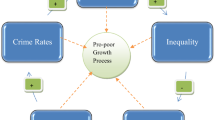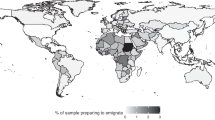Abstract
This paper analyses the determinants of trust in a pool of 34 European countries over the period 2002–2012. We find that income inequality is negatively related with generalized trust when we analyze the pooled data of individuals with multilevel models, confirming a well-established result in the analysis of cross-country differences in trust. However, we are unable to find the same significant relationship when we estimate fixed effects models with a panel dataset composed by countries. It is plausible that unobserved effects may account for the significant and negative relationship between economic inequality and trust at the cross-sectional level. In contrast, in the fixed effects models, we find negative and significant effects of ethnic and linguistic fractionalization, discrimination (general or based on migrant status) and crime rates on trust.



Similar content being viewed by others
Notes
In our dataset, the Cronbach’ alpha of the three items of general trust is 0.784.
The question in the ESS survey is “What language or languages do you speak most often at home?” (first mentioned).
References
Alesina, A., & La Ferrara, E. (2002). Who trusts others? Journal of Public Economics, 85, 207–234.
Algan, Y., & Cahuc, P. (2010). Inherited trust and growth. American Economic Review, 100(5), 2060–2092.
Atkinson, A. B., Piketty, T., & Saez, E. (2011). Top incomes in the long run of history. Journal of Economic Literature, 49(1), 3–71.
Banerjee, A. V., & Duflo, E. (2003). Inequality and growth: What can the data say? Journal of Economic Growth, 8(3), 267–299.
Barro, R. J. (1999). Inequality, growth, and investment. NBER working paper No. 7038.
Berggren, N., & Jordahl, H. (2006). Free to trust? Economic freedom and social capital. Kyklos, 59, 141–169.
Beugelsdijk, S., de Groot, L. F., & Anton van Schaik, B. T. M. (2004). Trust and economic growth: A robustness analysis. Oxford Economic Papers New Series, 56(1), 118–134.
Bjørnskov, C. (2007). Determinants of generalized trust: A cross-country comparison. Public Choice, 130, 1–21.
Delhey, J., & Newton, K. (2005). Predicting cross-national levels of social trust: Global pattern or nordic exceptionalism? European Sociological Review, 21(4), 311–327.
Durlauf, S. N., & Fafchamps, M. (2004). Social Capital. In S. N. Durlauf & P. Aghion (Eds.), Handbook of economic growth. Amsterdam: North-Holland.
Fisher, J. A. V., & Torgler, B. (2013). Do positional concerns destroy social capital: Evidence from 26 countries. Forthcoming in Economic Inquiry.
Gustavsson, M., & Jordahl, H. (2008). Inequality and trust in Sweden: Some inequalities are more harmful than others. Journal of Public Economics, 92, 348–365.
Herzer, D., & Vollmer, S. (2012). Inequality and growth: evidence from panel cointegration. Journal of Economic Inequality, 10, 489–503.
Hooghe, M., & Reeskens, T. (2008). Cross-cultural measurement equivalence of generalized trust. Evidence from the European Social Survey (2002 and 2004). Social Indicators Research, 85(3), 515–532.
Hooghe, M., Reeskens, T., Stolle, D., & Trappers, A. (2009). Ethnic diversity and generalized trust in Europe. A cross-national multilevel study. Comparative Political Studies, 42, 198–223.
Jordahl, H. (2009). Economic inequality. In G. T. Svendsen & G. L. H. Svendsen (Eds.), Handbook of social capital. Cheltenham: Edward Elgar.
Karabarbounis, L. (2011). One dollar, one vote. The Economic Journal, 121, 621–649.
Knack, S., & Keefer, P. (1997). Does social capital have an economic pay-off? A cross country investigation. Quarterly Journal of Economics, 112, 1251–1288.
Knack, S., & Zak, P. J. (2002). Building trust: Public policy, interpersonal trust, and economic development. Supreme Court Economic Review, 10, 91–107.
Leigh, A. (2006a). Does equality lead to fraternity? Economics Letters, 93(1), 121–125.
Leigh, A. (2006b). Trust, inequality, and ethnic heterogeneity. Economic Record, 82(258), 268–280.
Persson, T., & Tabellini, G. (1994). Is inequality harmful for growth? American Economic Review, 84(3), 600–621.
Putnam, R. D. (2007). E pluribus unum: Diversity and community in the twenty-first century. Scandinavian Political Studies, 30(2), 137–174.
Rothstein, B., & Uslaner, E. M. (2005). All for all: Equality, corruption, and social trust. World Politics, 58(1), 41–72.
Seligman, A. B. (2000). The problem of trust. Princeton: Princeton University Press.
Solt, F. (2009). Standardizing the world income inequality database. Social Science Quarterly, 90(2), 231–242 (SWIID Version 3.1, December 2011).
Steijn, S., & Lancee, B. (2011). Does income inequality negatively affect general trust? Examining three potential problems with the inequality-trust hypothesis. GINI discussion paper No. 20.
Sunders, P. (2010). Beware false prophets. Equality, the good society and the spirit level. London: Policy Exchange.
Uslaner, E. M. (2002). The moral foundations of trust. Cambridge: Cambridge University Press.
Uslaner, E. M., & Brown, M. (2005). Inequality, trust, and civic engagement. American Politics Research, 33(6), 868–894.
Wilkinson, R., & Pickett, K. (2010). The spirit level. Why equality is better for everyone (2nd ed.). London: Penguin Books.
Zak, P. J., & Knack, S. (2001). Trust and growth. Economic Journal, 111(470), 291–321.
Author information
Authors and Affiliations
Corresponding author
Appendix
Appendix
See Fig. 4.
Rights and permissions
About this article
Cite this article
Olivera, J. Changes in Inequality and Generalized Trust in Europe. Soc Indic Res 124, 21–41 (2015). https://doi.org/10.1007/s11205-014-0777-5
Accepted:
Published:
Issue Date:
DOI: https://doi.org/10.1007/s11205-014-0777-5





